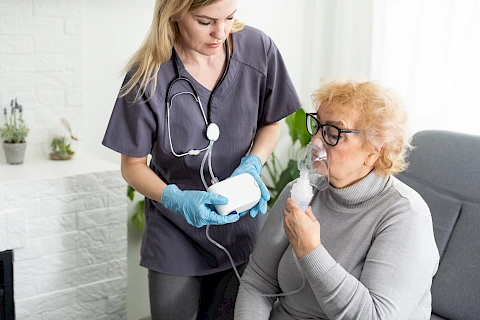
Fall can bring challenges, especially in dealing with elderly seasonal allergies. As the leaves change color and the air becomes crisper, allergens such as pollen, mold spores, and dust mites can wreak havoc on one's respiratory system. At Senior Helpers, we believe that managing hypersensitivity is crucial for maintaining overall health and well-being.
Identifying Allergy Manifestation
Sensitivities to irritants around this season show in various ways, particularly in older adults. Symptoms can be mistaken for other respiratory conditions such as colds or the flu, but the common ones include:
- sneezing
- runny or stuffy nose
- itchy eyes, throat, or ears
- coughing
- fatigue
Signs of sensitivity to irritants last as long as exposure to the allergen continues, while colds typically resolve in about a week. It's best to monitor symptom duration and consult a healthcare provider if unsure. Immediate medical attention is needed for severe symptoms like difficulty breathing, as serious allergies can cause complications such as asthma or sinus infections.
Creating an Allergen-Free Home Environment
Maintaining a clean living space is essential for reducing exposure to sensitizers. Here are some tips to help make your home free from irritants:
- Regular Cleaning: Vacuum carpets and rugs weekly with a HEPA filter vacuum, and regularly dust surfaces and wash bedding to minimize irritants.
- Air Purifiers: Invest in a quality air purifier for your main room to eliminate airborne antigenic substances, ensuring it fits the room size.
- Managing Outdoor Allergens: To minimize home irritants, close windows during high pollen periods and change clothes after being outdoors.
Working With Healthcare Providers
Consulting with doctors is crucial for effectively managing elderly seasonal allergies. They will help identify allergens and recommend appropriate treatments for a more comfortable fall season.
- Treatment Options: Common treatments include antihistamines, nasal corticosteroids, and decongestants. Doctors may also recommend allergy shots (immunotherapy) for long-term relief.
- Personalized Allergy Management Plan: Develop a plan with your healthcare provider that includes medication schedules, environmental controls, and emergency protocols.
Practical Tips for Daily Allergy Management
Staying informed about local pollen counts can help you plan your activities and minimize exposure. Local weather reports often include pollen forecasts, making staying ahead of high-pollen days easier.
Incorporate allergy-friendly practices into your daily routine. Shower and wash your hair before bed to remove it, and avoid hanging clothes outside to dry during high pollen days.
If you rely on over-the-counter remedies, make sure to use them correctly. Always read labels and follow dosing instructions. If you have any questions, consult your healthcare provider or pharmacist.
Improving Quality of Life Is Our Commitment to You
Effectively managing elderly seasonal allergies involves learning about and applying daily management tips to maintain health and well-being, allowing for this enjoyable time of the year.
If you reside in Soldotna, Anchorage, Homer, Kenai, or Seldovia and seek support for your elderly loved one, don't hesitate to contact us at Senior Helpers Kenai Peninsula. We would love to discuss our services for seniors and their caregivers, such as Personal Care and Chronic Disease Care.